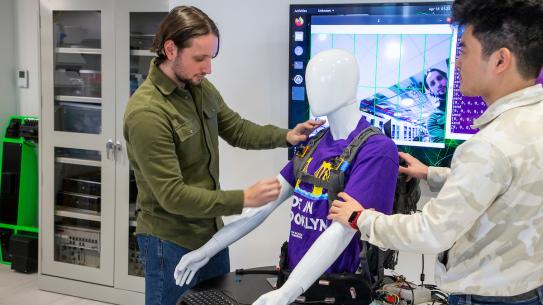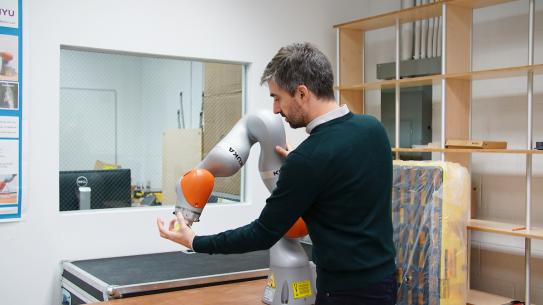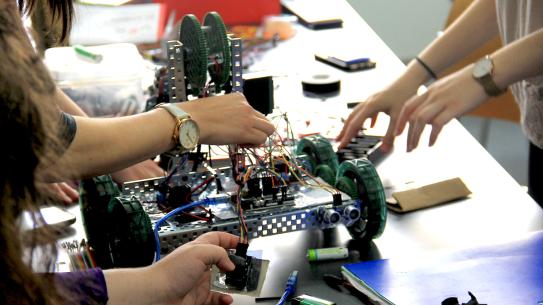Labs and Groups
Much of our research is multi-disciplinary. Our faculty and students partner with colleagues in other departments in the School of Engineering, as well as other NYU Schools.

Agile Robotics and Perception Lab
ARPL performs fundamental and applied research in robot autonomy. The lab develops agile autonomous drones that can navigate on their own using only onboard sensors without relying on maps, GPS or motion capture systems.
AI4CE Lab
The AI4CE Lab works to advance fundamental automation and intelligence technologies, to enable their use in civil and mechanical engineering applications.
Applied Dynamics and Optimization Laboratory
We aim to establish mathematical models, quantitative criteria, and algorithmic/computational foundations toward their implementations in robotics (for design and control), biomechanical systems (for prediction and analysis), and their intersections such as lower-body wearable robots. Our current research topics include energetics of dynamic systems, legged balance and gait stability, and integration of dynamics/control with numerical optimization.
Applied Micro-Bioengineering Laboratory (AMBL)
Taking advantage of state-of-art nanotechnologies and fabricating fascinating functional biomaterials and integrated biosystems, the Professor Weiqiang Chen’s laboratory addresses numerous important problems in fundamental biology as well as clinical applications in disease diagnosis and treatment.
Composite Materials and Mechanics Laboratory
CMML focuses on research related to lightweight highly damage tolerant materials and aims at understanding the fundamental role of porosity in materials. The specialty of the lab is in the area of hollow particle filled composites called syntactic foams and in dynamic characterization of materials. CMML has been working on polymer and metal matrix syntactic foams for civilian and military automotive applications that are exposed to dynamic loading conditions. The other areas of interest to CMML are additive manufacturing and sensors for structural health monitoring.
Dynamical Systems Laboratory (DSL)
Professor Maurizio Porfiri’s group conducts multidisciplinary research in the theory and application of dynamical systems, motivated by the objectives of advancing engineering science and improving society. Their theoretical expertise is in controls, networks, nonlinear dynamics, and time-series, while our application domain is in modeling and analysis of physical, social, and technical systems.
Fire Research Group
Researchers at the Fire Research Group work on an online, scenario-based simulation training program for firefighters. ALIVE (Advanced Learning through Integrated Visual Environments) is a decades-long effort to bridge the information gap between research and real-life firefighting.
Machines in Motion
We try to understand the fundamental principles for robot locomotion and manipulation that will endow robots with the robustness and adaptability necessary to efficiently and autonomously act in an unknown and changing environment.
Mechatronics, Controls, and Robotics Lab
The lab provides undergraduate and graduate students a real-world, hands-on experience in modern DSP- and PC- based data acquisition and real-time control.
Medical Robotics and Interactive Intelligent Technologies (MERIIT)
Led by S. Farokh Atashzar, the MERIIT Lab develops and implements artificial intelligence algorithms, smart wearable hardware, advanced control systems, and signal processing modules systems to augment human capabilities using multimodal robotic technologies.











